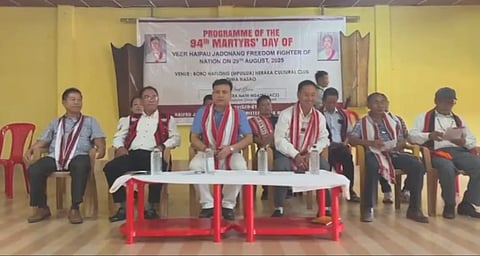
- Home
- Live Blog
- Breaking News
- Top Headlines
- Cities
- NE News
- Sentinel Media
- Sports
- Education
- Jobs

OUR CORRESPONDENT
HAFLONG: The 94th Martyrs’ Day commemorating the legacy of unsung freedom fighter Haipou Jadonang was solemnly observed at the Boro Haflong Heraka Cultural Club on Friday. The event was organized by the Haipou Jadonang Trust Committee.
The programme was graced by Munindra Nath Ngatey, District Commissioner of Dima Hasao, as the chief guest. Leaders from the Zeme Naga and Rongmei Naga communities, alongside students, intellectuals, and well-wishers, gathered to pay tribute to the visionary leader.
Floral offerings were made before a portrait of Haipou Jadonang, followed by a two-minute silence in his honour. Speakers at the event reflected on Jadonang’s life, his resistance against colonial rule, and his ultimate sacrifice—being hanged by the British administration on August 29, 1931 at Imphal Jail, at the young age of 26.
Haipou Jadonang Veer Haipou Jadonang (1905–1931) was a visionary Naga spiritual and political leader from Puilon (Kambiron) village in Manipur. He spearheaded the First Naga Raj Movement, challenging British colonial policies and advocating for the self-rule of the Zeliangrong people.
Jadonang famously declared, ‘Makaam mei rui Guangtu Puni’ (The son of the soil will reign). He mobilized youth under a force called ‘Riphen,’ providing military training to resist colonial oppression.
Alarmed by his growing influence, JP Mills, then Deputy Commissioner of Naga Hills, alerted JC Higgins, Political Agent of Manipur. Higgins instructed Christopher Gimson, Deputy Commissioner of Cachar, to arrest Jadonang.
On February 19, 1931, Jadonang was deceitfully lured by Lakhipur Police Officer Imtiaz Ali, posing as a civilian, under the pretext of treating his ailing wife. Instead, Jadonang was taken to the police station and arrested by Gimson. Higgins later ordered his extradition.
On March 1, 1931, Higgins reached Puilon, destroyed Jadonang’s prayer temple, looted local arms, and tortured villagers. Jadonang was handed over to Higgins at Jirighat on March 8 and taken to Manipur.
Despite questionable evidence, Jadonang was convicted on June 13, 1931 for the alleged murder of four betel leaf traders, a charge widely believed to be fabricated. He was executed on August 19, 1931, becoming a martyr in the fight against colonial rule.
Also Read: Assam: Bodoland Martyrs’ Day observed in Baksa district
Also Watch: